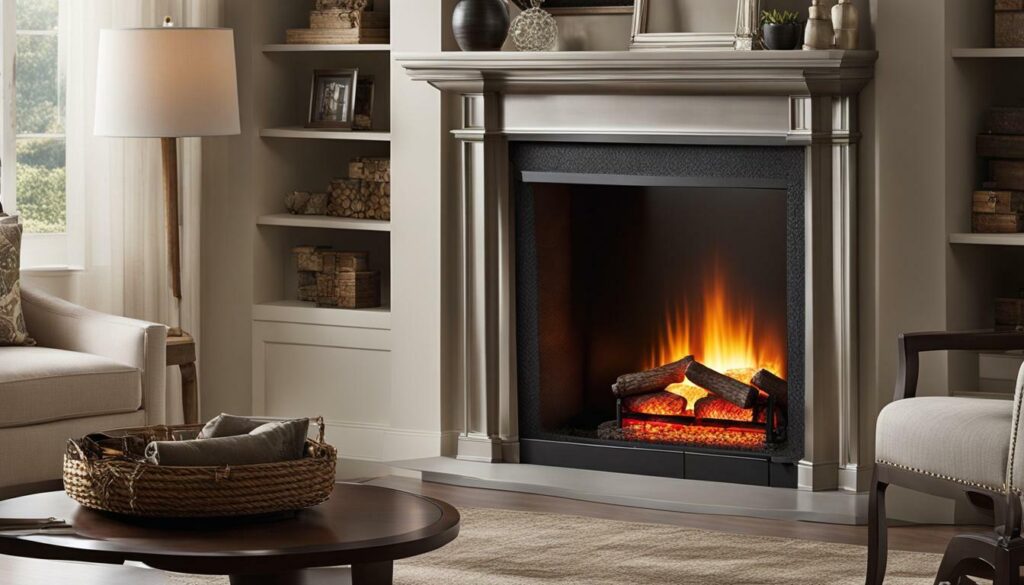Welcome to our latest article where we will be exploring the debate around electric fireplaces versus traditional units. As winter approaches, nothing compares to the comfort and warmth of a cozy fireplace. However, the choice between electric and traditional fireplaces can be a challenging one, as both offer unique advantages and disadvantages.
In this section, we will delve into the differences and similarities between electric and traditional fireplaces. We will explore factors such as heating efficiency, safety, and convenience, to help you make an informed decision when selecting the right fireplace for your home.
Key Takeaways
- Electric fireplaces and traditional units offer different advantages and disadvantages
- Factors such as heating efficiency, safety, and convenience need to be considered when choosing a fireplace
- By exploring the differences between electric and traditional units, you can make an informed decision that meets your needs and preferences
- Considerations such as maintenance, cost, and environmental impact also need to be evaluated
- Ultimately, the choice boils down to personal preference and your unique requirements
Benefits of Electric Fireplaces
Electric fireplaces offer numerous benefits over traditional units. One of their standout features is their energy efficiency. Unlike wood-burning fireplaces, which require constant fueling and cleaning, electric fireplaces can be easily operated with just the push of a button. This convenience makes them an ideal option for busy households.
Another advantage of electric fireplaces is their versatility. They come in a wide range of sizes and styles, allowing homeowners to choose the perfect fit for their space. Many models also include adjustable heat settings and flame effects, giving users complete control over the ambiance they want to create.
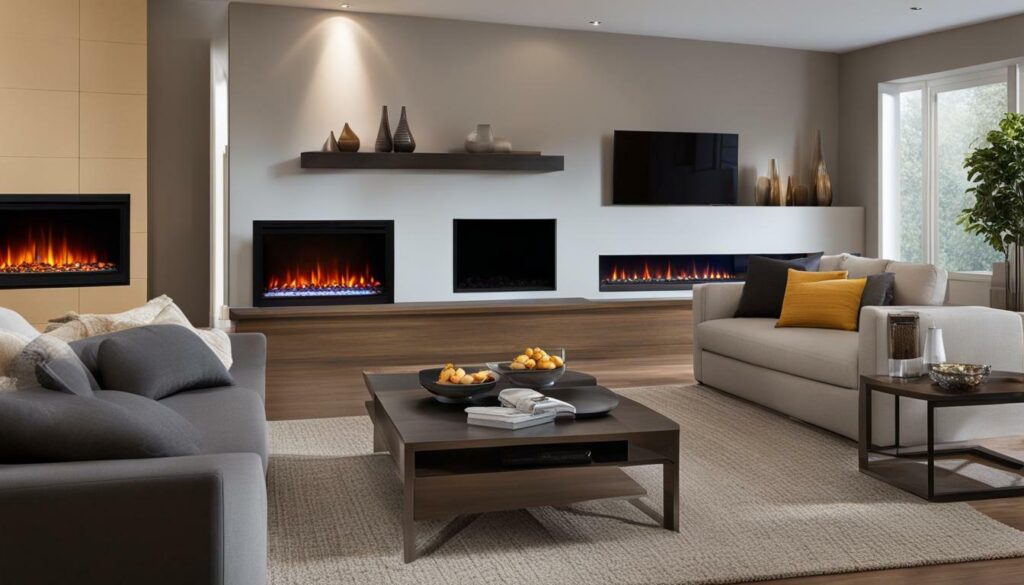
When it comes to maintenance, electric fireplaces require very little upkeep. They don’t produce any ash or soot, which means there’s no need to clean out a chimney or worry about creosote buildup. Additionally, electric fireplaces don’t emit any harmful gases or particles, making them a safe and eco-friendly option for any home.
If you’re looking to purchase an electric fireplace, it’s essential to consider the available features and options. Some models include additional features like remote controls, LED lighting, and built-in speakers. Reading electric fireplace reviews can be an excellent way to get a sense of the different options available and which models are best suited to your needs.
“Electric fireplaces offer numerous benefits over traditional units. One of their standout features is their energy efficiency.”
If you’re concerned about the appearance of an electric fireplace, rest assured that many models mimic the look of a traditional wood-burning fireplace, complete with realistic flames and logs. Some designs even offer the option for a flame effect without heat, perfect for adding ambiance to a room during warmer months.
Overall, electric fireplaces are an excellent option for homeowners who want the benefits of a fireplace without the hassle of traditional units. They’re safe, energy-efficient, and low-maintenance, making them an ideal choice for anyone looking to create a cozy, inviting atmosphere in their home.
Advantages of Traditional Fireplaces
While modern electric fireplaces offer a range of benefits, traditional fireplaces have their own unique advantages. For homeowners seeking a classic and cozy ambiance, a traditional fireplace may be the perfect choice.
One advantage of traditional fireplaces is the crackling sound of wood burning, which can be soothing and comforting, especially during colder months. The aesthetic appeal of a traditional fireplace is hard to beat, adding a touch of sophistication to any living space.
Another advantage of traditional fireplaces is that they can be used to cook food and roast marshmallows, providing a fun family activity. Additionally, they can be used as a source of light during power outages, making them a practical option in emergency situations.
However, it is important to note that traditional fireplaces come with their own set of limitations and drawbacks. Maintenance requirements, such as cleaning out ash and soot, can be time-consuming and messy. In addition, traditional fireplaces can pose safety risks, such as the potential for chimney fires and carbon monoxide buildup.
Overall, traditional fireplaces provide a unique charm and ambiance that electric fireplaces cannot replicate. However, it is important to weigh the advantages and limitations before making a decision.
“The crackling sound of wood burning can be soothing and comforting, especially during colder months. The aesthetic appeal of a traditional fireplace is hard to beat, adding a touch of sophistication to any living space.”
Electric Fireplace vs Wood Burning Fireplace
When it comes to choosing between an electric fireplace and a wood-burning fireplace, there are several factors to consider. While the traditional wood-burning fireplace provides an authentic ambiance and heat source, electric fireplaces offer modern features and convenience. Let’s dive into the differences between these two popular fireplace options.
Heat Output
One of the main differences between electric and wood-burning fireplaces is the heat output. Wood-burning fireplaces produce radiant heat that can warm up a room quickly. However, this heat does not always distribute evenly throughout the room. On the other hand, electric fireplaces use a fan to blow warm air into the room, providing consistent and even heating. Additionally, electric fireplaces offer the option to adjust the temperature and heat output, allowing for more control over the warmth in the room.
Installation Requirements
Installing a wood-burning fireplace requires a chimney or ventilation system to vent the smoke and fumes out of the home. This can be a costly and time-consuming process, especially if the home was not built with a chimney. Electric fireplaces, on the other hand, do not require any special installation. They can simply be plugged into an outlet and turned on.
Environmental Impact
Wood-burning fireplaces have a negative impact on the environment due to the emissions released from burning wood. Electric fireplaces, however, do not produce any emissions and are considered more environmentally friendly.
Cost-Effectiveness
While wood is a cheap and renewable fuel source, the cost of installation and maintenance for a wood-burning fireplace can add up over time. Electric fireplaces, on the other hand, have a higher initial cost but require very little maintenance and can save money on energy bills in the long run.
Overall, the choice between an electric or wood-burning fireplace comes down to personal preference and lifestyle. If you are looking for a traditional and authentic ambiance, a wood-burning fireplace may be the best choice for you. However, if you are looking for convenience, efficiency, and modern features, then an electric fireplace may be the perfect fit.
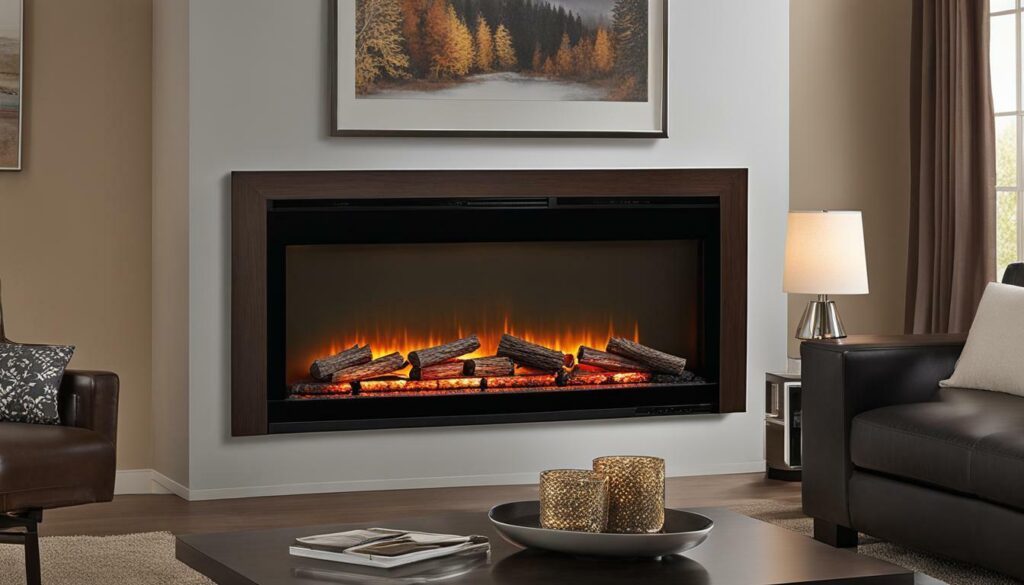
Electric Fireplace vs. Gas Fireplace
When it comes to choosing between an electric fireplace and a gas fireplace, there are a few key factors to consider. While both types of fireplaces offer convenience and ease of use, there are notable differences in terms of cost, installation, and maintenance.
Heat Efficiency
One of the main differences between electric and gas fireplaces is their heat efficiency. Gas fireplaces tend to produce more heat than electric models, making them a better choice for larger spaces or homes located in colder climates. Electric fireplaces, on the other hand, are more energy efficient and can help reduce heating costs.
Fuel Source Availability
Another factor to consider is the availability of fuel sources. Gas fireplaces require access to natural gas or propane, which may not be available in all areas. In contrast, electric fireplaces can be used anywhere there is an electrical outlet, making them a more versatile option.
Installation Requirements
Gas fireplaces require professional installation due to the need for gas line installation and ventilation. Electric fireplaces, however, can be easily installed by homeowners with no professional assistance required.
Maintenance
Gas fireplaces require regular maintenance, including the need for professional inspections and cleaning. Electric fireplaces, on the other hand, require minimal maintenance and can be easily cleaned by homeowners.
Overall, the decision between an electric fireplace and a gas fireplace depends on individual needs and preferences. If access to natural gas or propane is available and more heat output is desired, a gas fireplace may be the better option. However, if energy efficiency and easy installation and maintenance are a priority, an electric fireplace might be the way to go.

Factors to Consider When Buying an Electric Fireplace
If you’re considering purchasing an electric fireplace, there are several factors to take into account to ensure you choose the right one for your needs. Here is an electric fireplace buying guide to help you make an informed decision:
Size and Heating Capacity
The first thing to consider when buying an electric fireplace is the size and heating capacity. Measure the room where you plan to install the fireplace and choose a unit with the appropriate heating capacity for that space. If you have a large room, you may need a more powerful unit to efficiently heat the area.
Installation Options
Another important factor is installation options. Electric fireplaces come in several types, including wall-mounted, freestanding, and inserts. Wall-mounted units are ideal for small spaces, while freestanding units offer more flexibility in terms of placement. Inserts are designed to be installed into an existing fireplace, providing a quick and easy way to convert a traditional fireplace to electric.
Safety Features
Safety is paramount when it comes to electric fireplaces. Look for units with safety features such as automatic shut-off, cool-to-the-touch glass, and safeguards against overheating. These features can help prevent accidents and ensure that your home is safe and secure.
Budget Considerations
Electric fireplaces come in a wide range of prices, so it’s important to set a budget before you start shopping. Consider what features are most important to you, and look for units that fit within your budget. Remember, a higher price doesn’t always mean better quality, so be sure to compare features and prices to find the best value for your money.
Style and Design
Electric fireplaces come in a variety of styles and designs, so choose a unit that complements your home’s décor. Whether you prefer a traditional look or a modern aesthetic, there’s an electric fireplace to suit your style.
By considering these factors when buying an electric fireplace, you can choose a unit that provides efficient heating, optimal safety, and aesthetic appeal. Remember to read electric fireplace reviews and compare features before making your final choice.
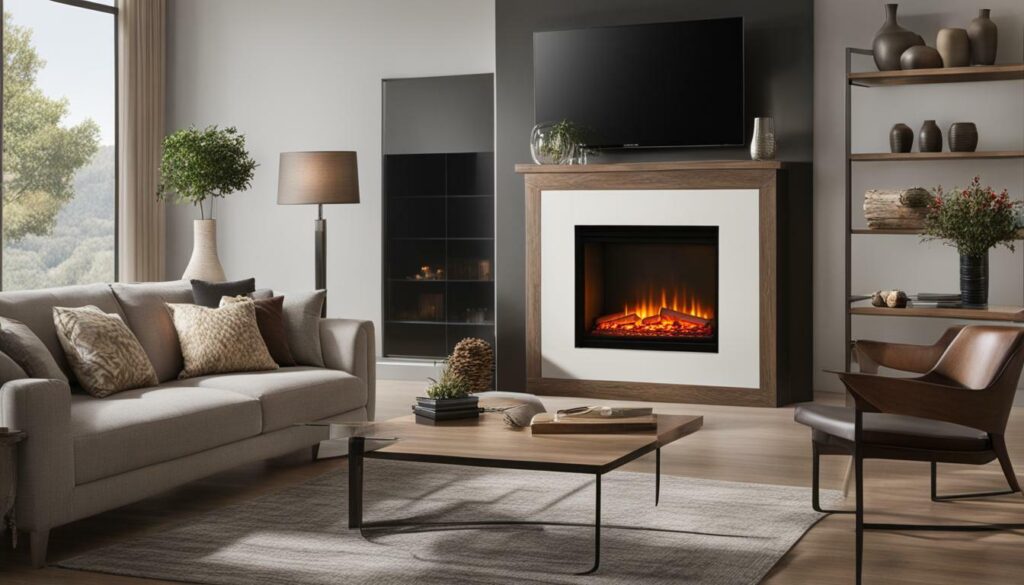
Environmental Impact of Electric and Traditional Fireplaces
When it comes to the environmental impact of fireplaces, there are several factors to consider. Wood-burning fireplaces have long been a popular choice, but they are not without their drawbacks. Burning wood releases carbon dioxide and other pollutants into the air, contributing to air pollution and climate change. Additionally, the harvesting and transportation of firewood can have negative effects on forests and wildlife habitats.
Gas fireplaces, while cleaner burning than wood, still emit greenhouse gases and contribute to air pollution. However, electric fireplaces offer a more eco-friendly option. They do not release any emissions or pollutants into the air, making them a cleaner choice for both indoor and outdoor use.
Another environmental factor to consider is energy efficiency. Traditional fireplaces can be highly inefficient, losing up to 90% of the heat they produce through the chimney. Electric fireplaces, on the other hand, convert all of their energy into heat, making them highly efficient and cost-effective.
Overall, when it comes to environmental impact, electric fireplaces are the clear winner. They offer a clean, efficient, and cost-effective alternative to traditional fireplaces, without harming the environment or contributing to air pollution.
Safety Considerations for Electric and Traditional Fireplaces
While fireplaces can be a great addition to any home, they can also pose safety risks if not used properly. In this section, we will discuss the safety considerations for both electric and traditional fireplaces to ensure that you can enjoy your fireplace safely.
Safety considerations for electric fireplaces
One of the advantages of electric fireplaces is that they don’t emit fumes or gases, making them a safer option compared to traditional fireplaces. However, there are a few things to keep in mind when using an electric fireplace:
- Make sure the electrical outlet used for your electric fireplace is grounded and suitable for the wattage used. Avoid using extension cords or adapters, which can cause a fire hazard.
- Never place any objects on top of the electric fireplace, as they can overheat and cause a fire.
- Keep the electric fireplace away from water and other liquids to avoid electrical shock.
- Always turn off the unit when it’s not in use.
By following these guidelines, you can safely enjoy the warmth and ambiance of your electric fireplace.
Safety considerations for traditional fireplaces
Traditional fireplaces can create a cozy and inviting atmosphere, but they require more care to use safely. Some safety considerations for traditional fireplaces include:
- Make sure your chimney is cleaned and inspected annually to prevent creosote buildup, which can cause a chimney fire.
- Only burn seasoned firewood, and avoid burning treated wood or trash, which can release toxic chemicals into the air.
- Use a fireplace screen or doors to keep sparks and embers from escaping the fireplace.
- Do not leave a fire unattended, and keep children and pets away from the fireplace.
By taking these safety precautions, you can enjoy the warmth and charm of a traditional fireplace without putting yourself or your home at risk.
In conclusion, both electric and traditional fireplaces can provide warmth and comfort in the home, but it’s important to prioritize safety when using them. By following these guidelines, you can enjoy the benefits of your fireplace without any safety concerns.
Maintenance and Upkeep of Electric and Traditional Fireplaces
Owning a fireplace can be a wonderful addition to a home, but it also requires regular maintenance and upkeep to ensure it functions properly and safely. In this section, we will discuss the pros and cons of maintenance for electric and traditional fireplaces, including the necessary steps to keep them clean and efficient.
Traditional Fireplace Pros and Cons
Traditional fireplaces are a classic addition to any home, offering a cozy ambiance and the crackling sound of wood burning. However, they do require more maintenance than electric fireplaces.
| Pros | Cons |
|---|---|
| Cozy ambiance | Regular cleaning required |
| Visual appeal | Regular fueling required |
| Natural heating source | Potential safety concerns |
Traditional fireplaces require regular cleaning to remove creosote buildup and prevent chimney fires. Fueling with wood also requires the homeowner to keep a supply of dry, seasoned wood on hand at all times. Additionally, traditional fireplaces can pose safety concerns, including the risk of sparks and carbon monoxide buildup, especially if the chimney is not properly maintained.
Electric Fireplace Reviews
Electric fireplaces, on the other hand, require minimal maintenance. They do not produce ashes or creosote buildup, and there is no need to constantly refuel with wood or gas.
According to customer reviews, electric fireplaces are easy to clean and maintain. Some models also come with self-cleaning features, eliminating the need for manual cleaning. Additionally, electric fireplaces do not require professional installation, making them a popular choice for homeowners looking for a low-maintenance heating option.
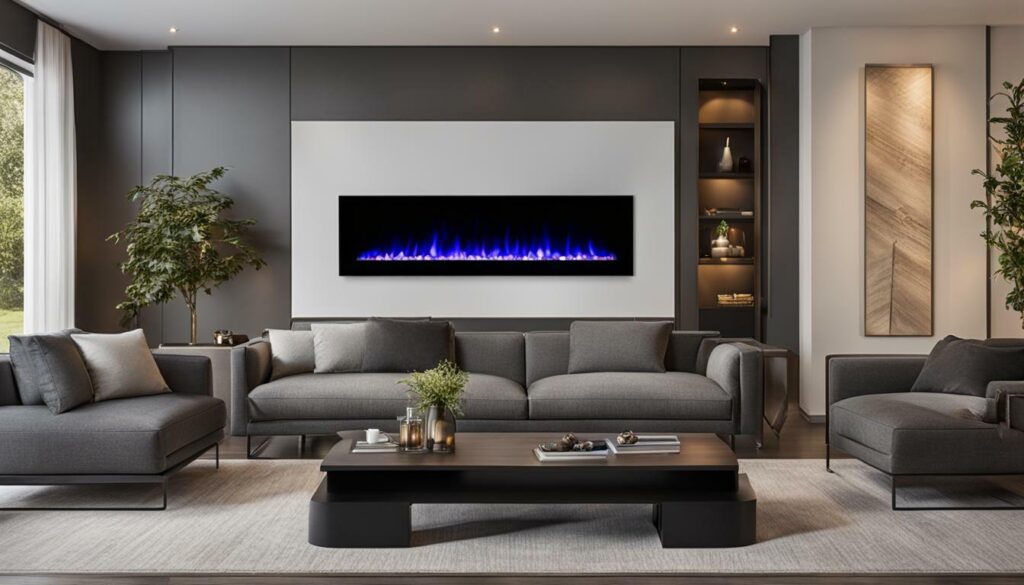
Maintenance Tips for Electric and Traditional Fireplaces
Regardless of the type of fireplace, regular maintenance is necessary to ensure it runs efficiently and safely. Here are some tips for keeping your fireplace in top condition:
- Clean the fireplace regularly to remove any ash, debris, or creosote buildup.
- Schedule annual inspections with a professional chimney sweep to ensure the chimney is clear of blockages and potential hazards.
- Use only dry, seasoned wood in traditional fireplaces to reduce the risk of creosote buildup and chimney fires.
- For gas and electric fireplaces, follow the manufacturer’s instructions for cleaning and maintenance.
- Replace any damaged or worn fireplace components immediately to ensure safe and proper functionality.
By following these maintenance tips, you can keep your electric or traditional fireplace running smoothly and safely for years to come.
Making the Decision: Electric or Traditional Fireplace?
Now that we’ve explored the benefits and drawbacks of both electric and traditional fireplaces, it’s time to make a decision. Choosing the right fireplace for your home depends on several factors, including your heating needs, personal preferences, and budget.
If you are looking for a low-maintenance and convenient option, an electric fireplace may be the best choice. They offer easy installation, adjustable heat settings, and customizable flame effects. Plus, they are eco-friendly and safe to use, making them an excellent choice if you have small children or pets.
Alternatively, if you prefer the cozy ambiance of a crackling fire and enjoy the traditional aesthetic appeal, a wood-burning or gas fireplace may be more suitable. While they require more maintenance and can be less energy-efficient, they offer a classic and timeless warmth that electric fireplaces cannot replicate.
Ultimately, the choice between electric and traditional fireplaces comes down to personal preference. By considering the benefits and drawbacks of both options, you can make an informed decision that fits your lifestyle and heating needs.

Electric fireplaces are low-maintenance, convenient, and eco-friendly. Traditional fireplaces offer a classic warmth and timeless aesthetic appeal. The choice ultimately depends on personal preference and heating needs.
Pros and Cons of Electric Fireplaces
Electric fireplaces have gained in popularity due to their modern design, energy efficiency, and ease of use. However, like any heating appliance, they have their pros and cons. In this section, we will take a look at both the advantages and disadvantages of electric fireplaces.
Pros of Electric Fireplaces
| Advantages | Description |
|---|---|
| Energy Efficiency | Electric fireplaces are highly efficient, with an average of 99% of electrical energy converted into heat. This results in significant energy savings on monthly utility bills. |
| Easy Installation | Electric fireplaces require no venting or chimney, making them easy to install in any room of the house. Simply plug them in and turn them on. |
| Customizable Settings | Most electric fireplaces allow users to adjust the heat output and flame effects to create their desired ambiance. Some models even come with remote controls for added convenience. |
| No Maintenance Required | Unlike traditional fireplaces, electric fireplaces do not require any cleaning or maintenance, as they do not produce smoke, ash, or soot. |
Cons of Electric Fireplaces
| Disadvantages | Description |
|---|---|
| Lack of Authenticity | While electric fireplaces may look realistic, they lack the authenticity of a traditional wood-burning fireplace. Some people may prefer the crackling sounds and natural scent of a traditional fireplace. |
| Not Suitable for Large Spaces | Electric fireplaces are best suited for small to medium-sized rooms, as they may not be able to provide sufficient heat in larger spaces. |
| Not Environmentally Friendly | While electric fireplaces are energy-efficient, they still rely on electricity, which is largely produced from fossil fuels. This means they may have a negative environmental impact. |
| Limited Heating Capacity | Electric fireplaces generally have a lower heat output than traditional fireplaces, as they rely on electricity rather than burning fuel. This means they may not be as effective in providing warmth on extremely cold days. |
As you can see, electric fireplaces have several advantages and disadvantages. Ultimately, the decision to choose an electric fireplace over a traditional one will depend on individual needs and preferences. However, with their sleek designs and modern features, electric fireplaces offer an attractive and practical alternative to traditional units.
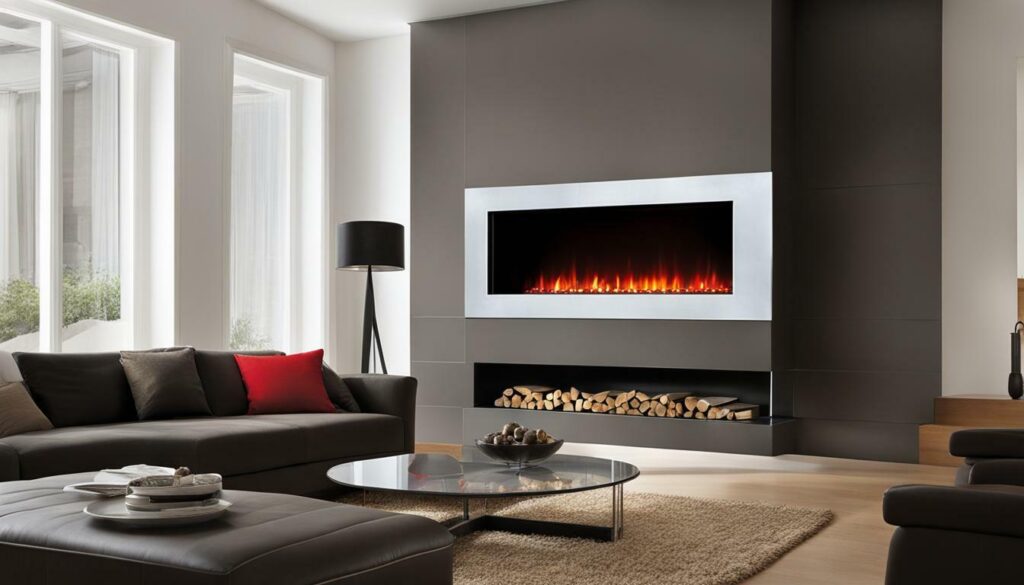
Conclusion
In conclusion, choosing between electric and traditional fireplaces ultimately depends on individual needs and preferences. While traditional fireplaces offer a cozy ambiance and unique aesthetic appeal, they come with maintenance requirements and potential safety concerns. On the other hand, modern electric fireplaces are energy-efficient, easy to use, and offer various features such as adjustable heat settings and flame effects.
Throughout this article, we have explored the differences and similarities between electric and traditional fireplaces, as well as their respective advantages and disadvantages. We have also provided essential information on safety considerations, maintenance requirements, and environmental impacts. By weighing these factors carefully, readers can make an informed choice that fits their lifestyle and preferences.
Consider an Electric Fireplace
It’s worth noting that modern electric fireplaces are gaining popularity due to their many benefits and advantages over traditional units. They are a cost-effective, eco-friendly, and convenient option for homeowners who want to enjoy the comfort of a fireplace without the hassle and maintenance involved with traditional units.
Whatever choice homeowners make, we hope this article has provided valuable insights into the world of fireplaces. Whether you opt for the traditional charm of a wood-burning fireplace or the modern convenience of an electric unit, a cozy and inviting atmosphere is just a flick of a switch away.
FAQ
Q: What are the benefits of electric fireplaces?
A: Electric fireplaces offer energy efficiency, adjustable heat settings, and various flame effects. They are easy to use and require no chimney or venting.
Q: What are the advantages of traditional fireplaces?
A: Traditional fireplaces provide a cozy ambiance, the crackling sound of wood burning, and a classic aesthetic appeal. However, they require maintenance and can pose safety concerns.
Q: How do electric fireplaces compare to wood-burning fireplaces?
A: Electric fireplaces are easier to install, emit no smoke, and require less maintenance compared to wood-burning fireplaces. However, wood-burning fireplaces offer a more authentic ambiance and heat output.
Q: What are the differences between electric fireplaces and gas fireplaces?
A: Electric fireplaces are more energy-efficient, require no gas line, and have lower installation and maintenance costs compared to gas fireplaces. However, gas fireplaces may offer greater heat output and fuel source availability.
Q: What factors should I consider when buying an electric fireplace?
A: When purchasing an electric fireplace, consider factors such as size, heating capacity, installation options, safety features, and budget.
Q: What is the environmental impact of electric and traditional fireplaces?
A: Electric fireplaces produce no carbon emissions, making them more eco-friendly than traditional fireplaces, which burn wood or use gas. Wood-burning fireplaces have the highest carbon emissions.
Q: What safety considerations should I keep in mind for electric and traditional fireplaces?
A: Both electric and traditional fireplaces have safety considerations such as fire hazards, carbon monoxide risks, and child safety. It is important to follow proper usage and installation guidelines to ensure safety.
Q: What maintenance is required for electric and traditional fireplaces?
A: Electric fireplaces require minimal maintenance, usually limited to cleaning the glass and checking electrical connections. Traditional fireplaces require regular cleaning, fueling, and chimney maintenance.



